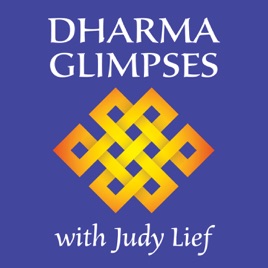
Advertise on podcast: Dharma Glimpses with Judy Lief
Rating
4.9 from
Country
This podcast has
161 episodes
Language
Publisher
Explicit
No
Date created
2021/03/05
Average duration
8 min.
Release period
7 days
Description
DHARMA GLIMPSES is an introduction to The Profound Treasury teachings of Chögyam Trungpa Rinpoche, taught by Judy Lief. In these short, accessible talks, Judy invites listeners to explore the subtleties and delights of the Buddhist path of meditation and insight. She introduces listeners to some of the key ways that mark Chögyam Trungpa Rinpoche's unique and brilliant exposition of the dharma in the context of contemporary Western society.
Podcast episodes
Check latest episodes from Dharma Glimpses with Judy Lief podcast
Episode 161: No Friendliness, No Path
2024/02/20
Loving kindness – known in Sanskrit as maitri – is a cornerstone of the entire Buddhist path • without loving kindness, no matter how much you meditate or how much you study the dharma, it will lack ultimate value • maitri is the valve through which the power of the dharma can flow • it is the foundation of true spiritual practice; it is transformative; and it is fundamental to our human nature • yet, ironically, it's easy to lose our connection, to lose that sense of the heart of things • at first, maitri might arrive just as simple little pinpricks, little noticings in the midst of our struggles and dramas • in the midst of all that, there are little refreshing moments where we're pulled out of our own dramas for a second • it might be sparked by the simplest thing — as simple as the sun coming out from behind the clouds after days of cloudiness • when we start to notice those little moments, we begin to realize that kind of tenderness and heartfulness of life is always there • instead of being caught up in perpetual strategies and struggles to secure happiness, maitri, or loving kindness, is something that is always accessible, no matter the circumstances.
more
Episode 160: Don't Be So Gullible
2024/02/13
When Trungpa Rinpoche spoke about the importance of joining intellect and intuition, he was referring to combining learning and study with the practice of meditation • the practice of meditation helps us to overcome the chaos of conflicting emotions, while learning or sharpening the intellect leads to gentleness • the idea of learning in this case isn't necessarily about acquiring large amounts of of information; it is about cultivating an inquisitive mind • first you need to listen and learn, to pay attention, to get the facts • but then you have to really think about what you have learned; you have to work with it and struggle with it • there's a kind of laziness of mind that settles for a superficial understanding without really questioning what is being said, and why • this is particularly true in this “age of information,” which in many ways has become the age of disinformation and conspiracy theories • there is a tendency to not really think about what you hear, but just respond on an emotional level to rumor and innuendo • such gullibility can leave us vulnerable to manipulation by people who don't necessarily have the best of intentions • the type of questioning I'm referring to is not cynical questioning based on hatred and aggression, but a questioning that comes from curiosity and genuine interest • because we're willing to question ourselves as well as others, it leads to a kind of softness or gentleness, as well as clarity and depth.
more
Episode 159: Our Portable Stage
2024/02/06
When you go to a play, you see people who are pretending to be other people; they learn their lines and move about in scripted ways • they perform on a stage, and in front of the stage is an audience, people watching a little world unfold in front of them • so there are the actors, the audience, and the relationship between the two • Trungpa Rinpoche suggested that we're not all that different from actors on a stage • he used the metaphor of a “portable stage” that we carry around with us, so we can act out our little dramas in front of our little audiences • like the actors, we go through life pretending — looking for applause, affirmation, recognition... maybe even an Emmy • this tendency is heightened by social media, where we're all posing, gathering likes and freaking out about dislikes and unfriendings • do we even know who we are when there is no audience to confirm us? • one aspect of meditation is finding some simple ground that is not part of this game, that is not dependent on affirmation or confirmation, but is direct, immediate, simple experience • we can begin to investigate for ourselves: how we are relating to the roles we find ourselves in, or that we create? how can we avoid becoming trapped within these roles? why do we always need an audience? and how can we make use of such roles for benefit? • these are questions that might be worth exploring.
more
Episode 158: The Row, Row, Row Your Boat Sutra
2024/01/30
One of my favorite nursery rhymes contains quite a bit of wisdom: “Row row, row, row your boat gently down the stream; merrily, merrily, merrily, life is but a dream” • if we think of the stream as a stream of teachings, then we could consider the Buddha as the source of the stream • from that beginning a great river continues to flow over thousands of years • where does this stream flow? It flows into an ocean, which you could say is the awakening of the practitioner • you have a boat to carry you down this stream, and you have a set of oars to row with • what kind of effort do you apply? it's a steady effort, but it's also a relaxed effort: you're rowing gently, but regularly and persistently • and how are you doing all this? you're doing it merrily, merrily, merrily, merrily • it's not a big struggle; there's a sense of delight • in fact it could be dreamlike because it's not so solid, it's not so frozen • we're in a shifting and changing world; it's so dreamlike and so unreal in so many ways, but so beautiful and colorful at the same time.
more
Episode 157: When You Lose Your Mind, Come Back
2024/01/23
The phrase, “When you lose your mind, come back” describes a lot of what happens in meditation: repeatedly losing our minds, and repeatedly bringing ourselves back • the moment we’ve noticed we’ve lost it is the moment we can return • what are we returning to? the simplicity of the present moment • another phrase Trungpa Rinpoche used quite a lot was, “Don’t think too much” • what are the benefits and what are the limits of thinking and conceptual understanding? • in the Buddhist tradition scholarship is highly valued • however, to be a realized person, to live a dharmic lifestyle, you don’t need to be a scholar; you don’t need to be all that clever • “coming back” in this context could mean coming back from the tangle of conceptual notes and fascinations to something immediate and basic and close to the heart • Trungpa Rinpoche used the term “intellect and intuition” when referring to these two streams • they are not in opposition or at war; there’s a sense of sophistication in the interplay between these two.
more
Episode 156: Strength and Vulnerability
2024/01/16
At our core is our tender heart, tinged with a touch of sadness • it is sweet and vulnerable • this soft spot may be deeply buried, but it is always there • even very simple or momentary experiences can connect us with this heart: you might watch a pair of swallows fly back and forth, over and over, bringing food to their hungry chicks, and something melts or softens in you • it is so beautiful to be touched in this way; but this inner core of tenderness can also make us feel threatened and vulnerable • so we learn to armor up, to wrap that tenderness in layers of protection • we begin to buy into the dichotomy between strength on the one hand and vulnerability on the other • little by little, we dull our feelings to hide our vulnerability • but as we hide that openness and vulnerability, we also cut off the tender wellspring of kindness and compassion • the posture of meditation, with its strong back and soft belly, symbolizes the integration of strength and vulnerability • when these two are in harmony, we may discover that our vulnerability is not actually a weakness, but our greatest source of strength • when we bring vulnerability and strength together in harmony, we begin to live in this world in a more confident, fresh, and vivid way.
more
Episode 155: Three Aspects of Space
2024/01/09
Trungpa Rinpoche emphasized the importance of understanding space; he encouraged us to explore our experiences of boredom, our discomfort with stillness, and our tendency to fill space • he taught that the basic energy pervading all of space is love and kindness; so to cultivate greater kindness and love, it is important to relate to space and its qualities • he introduced three aspects or qualities of space • the first is that space is indestructible, because it doesn't come from anywhere and doesn’t go anywhere; it is unborn, it is unceasing, and it is impossible to manipulate • the second aspect of space is that it accommodates birth and death: things are always arising and dissolving within it, and space accommodates it all • the third aspect of space is that it creates obstacles; it seems to rebel against our ideas of importance and what we'd like to accomplish • this aspect of space reminds me of the kind of experience people can have in the vicinity of a dying person • in that space, all projects and activities and preoccupations just dissolve on the spot • I'd like to invite you to explore these qualities of space in your daily life experience and in your meditation practice.
more
Episode 154: Space
2024/01/02
Today I'd like to explore the topic of space • the idea of space as it relates to meditation practice is connected with the notion of “gap” — noticing gaps at the end of each outbreath, noticing the little refreshing moments between things, which we often miss • our connection with space can be an almost embodied or physical sense of things: we can sense when a space seems threatening or welcoming • we can begin to explore our relationship with space very simply by noticing our tendency to keep ourselves occupied when discomfort arises • can we just be at ease with ourselves? can we relax in space? • when there is too much space we start to feel groundless; but when there is not enough space we begin to feel claustrophobic • so we look for some kind of spacious quality that we can manage, to fit between those extremes • but trying to manage space is like trying to corral the sky; it can't be done • space dissolves any such schemes and strategies • maybe we need to drop all of our strategies for a moment, and let wisdom arise spontaneously from the freedom and vastness of space.
more
Episode 153: Walls
2023/12/26
In this episode, I'd like to explore the idea of walls — our internal walls, as well as the walls we create between ourselves and others • we're told we need to have clear boundaries; at the same time, we have the challenge of how to bridge the gap between self and others • the wall between ourselves and others is not always so visible; it can take us by surprise as we try to connect in some way • there are times when we deliberately create walls: when we are developing a meditation practice, we wall off distractions and preoccupations in order to create a little island of sanity of some sort, as a form of protection for our mind • maybe the fundamental question is whether we're creating walls to protect our sanity, or whether we're creating walls to protect our confusion • walls can be about connecting, or about disconnecting • we need to explore how to make use of walls to connect with others, as opposed to shutting ourselves down and separating from others.
more
Episode 152: Peace
2023/12/19
I've been thinking a lot recently about peace, especially the Buddhist view of peace • it's one of those ironic things: throughout history people have longed for peace and prayed for peace, yet we seem unable to free ourselves from conflict, war and struggle • what’s more, our desire for peace can actually manifest as aggression: “if I can defeat my enemy, then I'll be able to finally have some peace” • when we talk about peace, what do we really mean? how is peace talked about in different aspects of the dharma? • Trungpa Rinpoche taught that we should be quite clear and precise as to the definition of the word: “In Buddhism, peace has nothing to do with pleasure. Peace is just simply peace. It is nonaggression. Nothing takes place. We simply quiet down. And in doing so, things become very clear” • peace is the absence of grasping, and it starts right at home with our own state of mind • the kind of peace that can develop from letting go of our fixation and grasping is incredibly energetic and powerful • according to Martin Luther King, peace is not merely a distant goal that we seek, but a means by which we arrive at that goal • it is simple, immediate, and direct • the force of peace is just as strong as the force of hatred and anger; and actions rooted in peace are even more courageous and forceful than actions springing from hatred.
more
Episode 151: Energies of Engagement
2023/12/12
Buddhist training has two sides, somewhat parallel to pure science and applied science • there is the meditation aspect, the inward journey; and there is the application of that in the world, or meditation in action • we all have the capacity to help; we all have the capacity to cultivate compassion and also to cultivate wisdom and insight, so that compassion is intelligent • but each of us has to find our own way to engage • according to the Buddhist teachings, there are five fundamental ways of engaging in the world • the first way is to create an accommodating, spacious mind through the practice of sitting meditation — which, according to my teacher, is one of the most radical things you can do • the second is exposing falsehood, clarifying situations, and providing information to address problems from a sane viewpoint • the third is providing resources like food or money • the fourth is cultivating relationships with people engaged in compassionate activities • the fifth has to do with understanding how to create organizations that can actually bring about effective action • this discussion is about taking stock of our own resources, as well as being aware of what we need to cultivate in order to effectively respond to the endless variety of challenges we all face.
more
Episode 150: Joy
2023/12/05
Lately I've been thinking about the slogan, “Always maintain only a joyful mind” • at the same time, I've been haunted by the teachings that describe samsara, the nature of reality, as an ocean of suffering • if the world is marked by endless suffering, how can you be joyful? and if the world is fundamentally good and wholesome, how do you account for suffering? • the Buddha's earliest teachings on the Four Noble Truths — suffering, the origin of suffering, the cessation of suffering, and the path — were presented as a liberating and joyful discovery • we recognize there are causes of suffering, and because of that, it's workable; because we can remove the causes of suffering, it's possible to free ourselves • whatever this joyful mind is about, it's not about pretending things are okay when they’re not • nor is it about closing off bad stuff so we can have a little island of good and hang out there • it's easy to feel that the only way we can show we care about this world and our fellow suffering beings is to feel bad all the time • but the quality of joy radiates; it actually affects the environment in a healing and a positive direction • without joy, things get very tight, more fixed, less visionary • I would go as far as to say that joy is an essential part of the heroic path of compassion.
more
Podcast reviews
Read Dharma Glimpses with Judy Lief podcast reviews
Stay Free 87
2024/02/10
Wonderful
Judy is wonderful and so is her podcast, which inspires me especially when feeling stressed during travel
DanaG.
2023/10/14
Wonderful
I really look forward to these glimpses, they really help to center my days and weeks.
MovingCenter
2023/02/25
Just right
These glimpses are a perfectly measured dose of insight and provocation, generously offered, and warmly delivered. Thank you.
McFaceplant
2022/09/10
Words of Wisdom
Judy’s dharma talks are clear and heartfelt. I had the opportunity to attend the Profound Treasury Retreat with Judy in September. It was a great expe...
more
Krum41
2022/09/05
Always on the mark
Judy is a wonderful teacher of the Dharma with a genuine approach and delivery
This stuff blossoms after she expresses it’s depth
bsg&msg
2022/09/04
Bite size Dharma teachings
I love this podcast for it’s short, jam packed teachings of the Dharma, so helpful!
kushu523
2022/01/14
Fresh start
Such nourishing words…
P Keats
2022/01/13
Like a breath of fresh air
Judy, thank you. These brief teachings are packed full of wisdom. Reminders for working with the mind on the cushion and in every day life. I listen t...
more
Rontrul
2022/01/13
Refreshing
Each episode is short and to the point
Always glad I listened
West Coast Big Al
2022/01/13
Great Dharma Presentations
These brief dharma talks are great to listen to before or after meditation.
Podcast sponsorship advertising
Start advertising on Dharma Glimpses with Judy Lief & sponsor relevant audience podcasts
You may also like these buddhism Podcasts
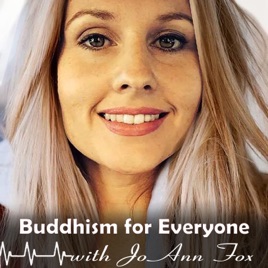
4.9
183
189
Buddhism for Everyone with JoAnn Fox
JoAnn Fox: Buddhist Teacher

4.8
449
99
AudioDharma: Gil Fronsdal's most recent dharma talks
www.audiodharma.org
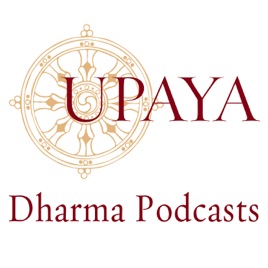
4.5
229
51
Upaya Zen Center's Dharma Podcast
Joan Halifax | Zen Buddhist Teacher Upaya Abbot
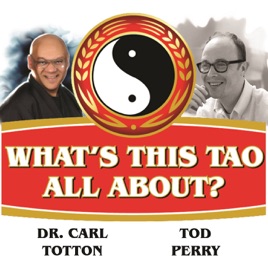
4.9
421
87
What's This Tao All About?
Tod Perry
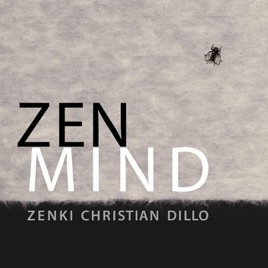
4.8
83
96
Zen Mind
Zenki Christian Dillo
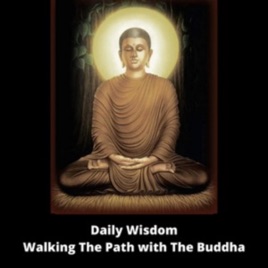
4.7
31
623
Daily Wisdom - Walking The Path with The Buddha
David Roylance
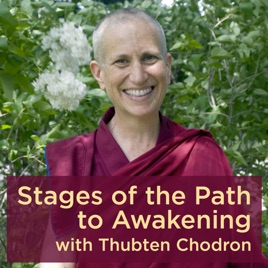
4.8
19
10
Stages of the Path to Awakening Podcast Archives - Thubten Chodron
Thubten Chodron
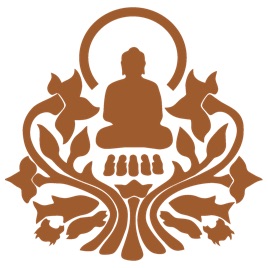
4.8
77
58
Dhammatalks.org Evening Talks
Thanissaro Bhikkhu
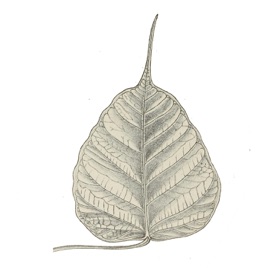
4.9
23
17
Dharma Seed - dharmaseed.org: dharma talks and meditation instruction
dharmaseed.org
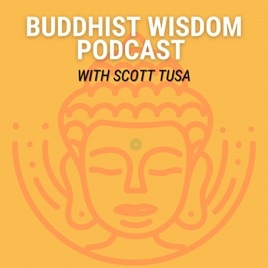
5
23
90
Buddhist Wisdom Podcast with Scott Tusa
Scott Tusa



